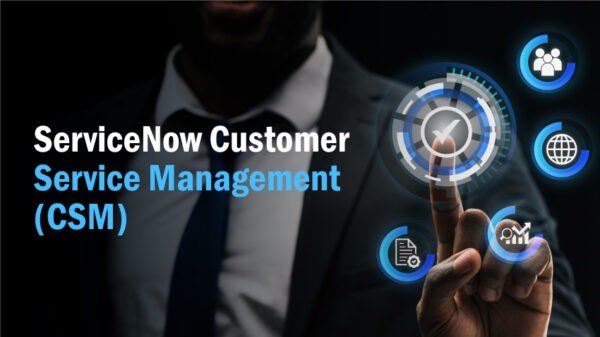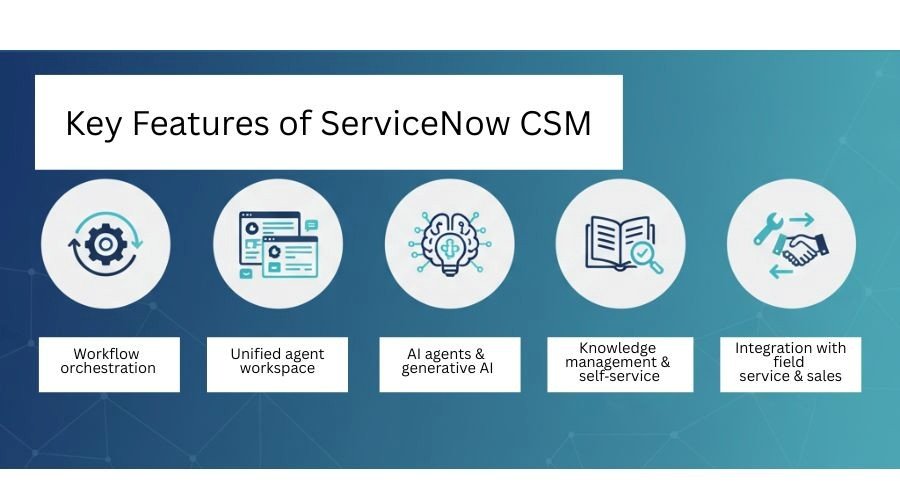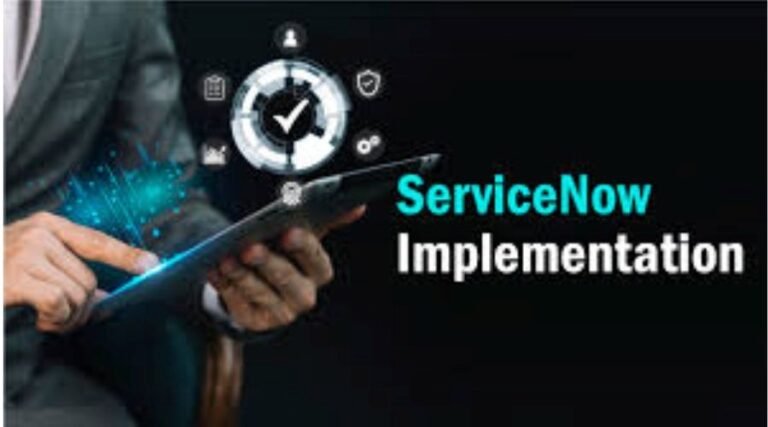What is ServiceNow CSM? Features, Benefits, and Use Cases Explained
14 +
Years of Experience
550 +
Happy Customers
250 +
Years of Tech Leadership Exp.

"License Reseller" and "Consulting & Implementation" Partner

Key Takeaways
ServiceNow CSM connects front-end customer support with back-office workflows, creating a single platform for faster and seamless issue resolution.
- Delivers true omnichannel service: Unifies web, chat, email, and phone interactions—so customers never have to repeat their stories.
- Automates workflows and case management: Uses AI and Integration Hub to reduce manual effort and improve response time.
- Boosts agent productivity and customer satisfaction: Through unified workspaces, self-service portals, and AI-powered virtual agents.
- Integrates seamlessly with other systems: Works with CRM, ITSM, and Field Service solutions to deliver proactive, data-driven customer experiences.
Customer expectations have undergone a complete transformation.
Today’s customers expect seamless support through web, email, chat, phone, and messaging, and they want their problems resolved without being bounced between departments.
Traditional CRM systems focus on front-end customer interactions, but agents need to use spreadsheets and tribal knowledge to link back-office workflows.
This human middleware system creates delays in problem resolution, leading to universal frustration.
ServiceNow Customer Service Management (CSM) is designed to fix this by connecting the front end and the back office on one platform.
In this article, let’s look at the ServiceNow CSM definition, features, implementation steps and advantages, and essential characteristics of the solution.
What is ServiceNow CSM?
ServiceNow Customer Service Management (CSM) is a platform that helps organizations manage and resolve customer issues efficiently by connecting customer service teams with other departments on a single system. It ensures that every customer request, from the first contact to final resolution, is handled smoothly without switching between multiple tools.
ServiceNow CSM goes beyond traditional CRM to orchestrate the entire customer service process from intake through fulfillment.
- The platform provides a system of record and a system of action so that work started in the front office can be completed across systems and departments.
- The system captures cases, issues, and orders through multiple communication channels before sending them to appropriate teams for processing.
- The system performs automated workflow operations that activate task assignments, approval processes, and system updates.
- The system provides answers through its knowledge base and AI-driven search functionality.
- The system generates performance data through its analytical capabilities.
- By modelling products, services, and request types centrally, ServiceNow removes the need to switch between different applications, which characterizes traditional CRM systems.
Why do businesses need ServiceNow CSM?
The market is going through a generational transformation driven by three catalysts: customers increasingly interact with AI‑powered virtual agents, contact centers are moving to the cloud, and organizations are tired of bloated legacy CRM apps. ServiceNow CSM addresses these shifts by:
- Meeting customers in any channel: Omnichannel engagement allows customers to interact via web, chat, email, phone or messaging and ensures context travels with the customer.
- Orchestrating the work behind the scenes: CSM handles the fulfillment work across departments rather than leaving agents to cobble together spreadsheets.
- Reducing costs and improving experiences: AI agents reason about the best way to fulfill a request and automate actions, providing great conversational experiences and empowering customers and agents.
- Accelerating customer success: Many Organizations have seen a one‑third decrease in mean time to resolution through ServiceNow’s AI capabilities.
Key features of ServiceNow CSM

ServiceNow CSM provides a complete set of features that enable proactive and predictive customer service delivery.
Omnichannel Intake
The system unites all contact channels through omnichannel intake, which accepts web, portal, phone, email, and chat communications. ServiceNow integrates with Contact Center as a Service (CCaaS) through contact center integrations, creating a single system for routing and workforce engagement.
Workflow Orchestration
Cases trigger workflows that span multiple departments. Automations and Integration Hubs connect CSM with billing, fulfillment, inventory, and field service systems.
Unified Agent Workspace
Agents access all channels, case details, and knowledge from a single interface, with native call controls and chat, reducing the need for multiple tools.
AI Agents and Generative AI
AI summarizes cases, recommends next actions, and can execute requests autonomously or with supervision. Customers benefit from conversational experiences, while agents save time and focus on complex tasks.
Knowledge Management and Self-Service
Customers and agents access knowledge articles and virtual agents for quick resolution. A 2022 ServiceNow study found that knowledge bases empower agents and reduce call volumes, leading to a 33% increase in employee satisfaction and up to 170% ROI over three years.
Integration with Field Service and Sales
CSM shares a common CRM data model with ServiceNow Field Service Management (FSM) and Sales and Order Management. Automatic work-order creation, intelligent scheduling, and integrated CPQ processes support end-to-end service and sales.
Benefits of ServiceNow CSM
When properly implemented, CSM delivers tangible business results:
- Improved customer satisfaction: Unified workflows mean customers don’t have to repeat their stories, and issues are resolved faster. Customers like BT achieved a one‑third reduction in mean time to resolution.
- Higher agent productivity: A unified desktop and AI assistants reduce swivel‑chairing and administrative work. Virtual agents and knowledge bases reduce phone calls by 40 % and email contacts by 80 %, according to a Forrester‑commissioned study.
- Lower operational costs: Automation eliminates manual tasks and reduces the need for multiple point solutions. The same Forrester study noted that CSM customers can realize up to 170 % ROI over three years.
- Proactive service: AI uses historical and real‑time data to identify issues before they impact customers and to suggest resolutions. Integration with field service and predictive maintenance improves first‑time fix rates.
- Unified customer and employee experiences: Because CSM shares a platform with FSM and HRSD, data flows seamlessly between customer support, field service and back‑office teams, enabling end‑to‑end visibility.
ServiceNow CSM use cases
ServiceNow provides flexible solutions that enable organizations to implement its model across various industries and different use cases.
- Telecommunications: The system should automate service provisioning and manage service orders, which affect both front and back office operations, to decrease mistakes and enhance customer happiness.
- Manufacturing and warranty management: The system manages warranty claims and returns through repair or replacement processes, which stay connected to supply-chain systems for parts delivery.
- Financial services: The system enables dispute resolution and regulatory processes through task management between legal and compliance, and customer service teams.
- Retail and e‑commerce: Provide unified customer support across online and in‑store channels, integrate order management, and offer proactive notifications.
- Healthcare: The system performs scheduling operations and patient communication management and insurance approval processing, and field service connections for home-based patient care.
How to implement ServiceNow CSM
Implementing CSM follows similar principles to the broader ServiceNow roadmap. Steps include:
1. Assess Maturity and Define Goals
The process begins with problem identification of customer service issues, followed by performance indicator development to show CSM solutions for these problems.
2. Select Use Cases and Create Data Model
The process requires two main steps, which involve selecting essential use cases followed by data model creation. Decide whether to start with case management, knowledge management, field service integration or CPQ. Model products, services, and request types centrally.
3. Configure Omnichannel and Contact Center Integrations
The system needs portal setup and chat, and voice channel implementation, and CCaaS integration to achieve unified routing functionality.
4. Build Workflows and Automations
The system operates through ServiceNow Flow Designer and Integration Hub for departmental process management, and AI technology executes automated routine tasks.
5. Pilot and Train
The program should start with a pilot test involving agents and customers to obtain feedback, which will help improve operations and deliver training to agents.
6. Roll out and refine
Expand to additional channels and use cases, monitor KPIs, and continuously improve knowledge articles and automations.
How ServiceNow CSM differs from ITSM and CRM
IT Service Management (ITSM) and Customer Relationship Management (CRM) share service process elements, but CSM operates with separate objectives and functional characteristics.
- Scope of service: ITSM delivers internal IT services, but CSM handles external customer interactions, which reach past IT support to include sales, field service, and fulfillment. It relies on a common CRM data model and workflows to manage orders, warranties, and service contracts.
- System of action: Traditional CRM focuses on storing customer data and supporting omnichannel interactions, but CSM couples this with a system of action. The system performs customer request fulfillment through its workflow management system, which combines automation with artificial intelligence orchestration.
- Overall operation: The system operates as a complete workflow system that starts with lead acquisition and continues through order completion and ongoing customer service delivery.
Get started with ServiceNow CSM and DevTools
A unified customer experience needs more than technology because it requires both strategic planning and specialized knowledge.
We are an authorized ServiceNow partner and help deliver CSM and related module implementation services. We have consultants with expertise who can assist businesses to create omnichannel strategies and develop workflows and system integration between CSM and their current CRM and billing, and ERP platforms.
The system uses automated tools and artificial intelligence to boost agent performance and enhance customer satisfaction through its conversion of complicated processes into automated self-service systems.
Businesses can speed up their deployment & implementation process through our partnership, which also verifies CSM solutions match their specific needs.
Simplify Your ServiceNow CSM Rollout
Talk to Our Certified Consultants Talk to Our Certified ConsultantsConclusion
ServiceNow Customer Service Management allows organizations to transform their customer service operations through its AI platform. Organizations can achieve faster issue resolution and higher customer satisfaction, and operational efficiency through the combination of omnichannel intake with workflow automation and AI, and analytics through CSM. The platform enables front-end user interactions to link with back-office fulfillment operations through its complete customer journey solution, which includes field service and sales integration. Organizations can achieve modern AI-based customer service benefits through DevTools’ support for successful CSM deployment.
FAQs
What is ServiceNow CSM?
CSM is a ServiceNow application that manages customer service processes end to end, from case intake through fulfillment. The system provides proactive service delivery through its combination of omnichannel communication with workflow orchestration and knowledge management, and AI.
Which industries use ServiceNow CSM?
CSM is used across telecommunications, manufacturing, financial services, retail, healthcare and the public sector. The system provides flexible operations that enable users to handle warranty management and dispute resolution and order management and proactive maintenance activities.
What is the difference between ITSM and CSM?
The internal service delivery of IT services falls under ITSM, but CSM handles customer service interactions from outside the organization. The system of action at CSM enables departments to work together for fulfillment operations, but CRM/ITSM tools primarily function to track requests without performing automated back-office operations.
How does ServiceNow CSM integrate with enterprise systems?
CSM includes Integration Hub and prebuilt connectors for CRM, ERP, contact center and field service systems. Its common data model allows for seamless workflows and real‑time data exchange.
Is CSM integrated with other ServiceNow applications?
Yes. CSM shares a platform with Field Service Management, Sales and Order Management, ITSM, and HRSD. This integration allows organizations to unify customer and employee experiences and to manage the entire order‑to‑cash cycle.
How long does it take to implement ServiceNow CSM?
Timelines vary based on scope, number of integrations and customizations. Simple case‑management deployments can take a few weeks, while large programs may take several months. Planning and sequencing, similar to the overall ServiceNow implementation roadmap, help set realistic expectations.
How does ServiceNow CSM improve customer satisfaction and retention?
CSM reduces resolution times through automation and AI, unifies communication channels, and provides proactive service. Forrester research shows that customers using CSM report higher employee satisfaction, reduced call volumes, and up to 170 % ROI.




